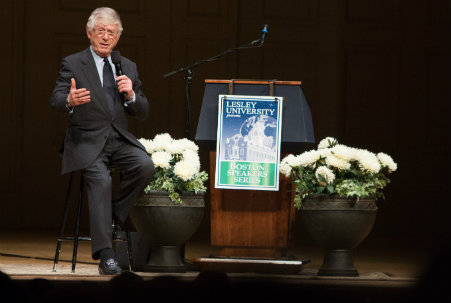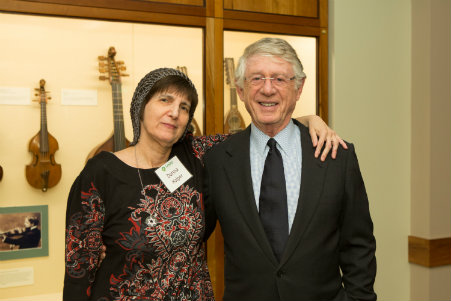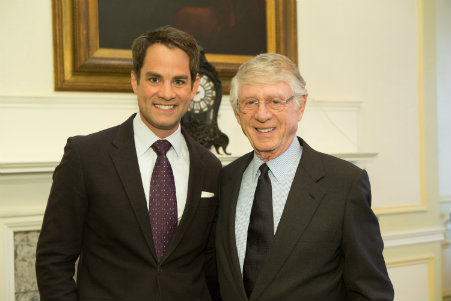As a former foreign correspondent in Vietnam, and the one-time host of the acclaimed news program “Nightline” for a quarter century, Ted Koppel is used to being in the middle of the action.

TV journalist Ted Koppel at Lesley University's Boston Speakers Series.
That’s why no one should have been surprised by his unflappability in the face of an emergency evacuation of Symphony Hall last night, after what appeared to be an errant fire alarm. As warning lights flashed and a recorded voice instructed the capacity crowd to vacate the premises, Koppel exhorted the crowd — in his stentorian yet laconic manner — to calmly file outside, promising, “We’ll see you back here soon.”
As he did before the interruption, Koppel regaled the Boston Speakers Series audience with his observations from his professional time overseas, interspersing serious reminiscences with uproarious anecdotes of flatulent luminaries and important cabinet officials in other embarrassing situations, as when former Secretary of State Henry Kissinger failed to notice his zipper was down during a flight to visit the Saudi king.
Koppel also festooned his lecture with what he called “a pretty damn good” impression of President Nixon (as well as Kissinger), and sang a humorous ditty about the Great Wall of China to the tune of “You’re a Grand Old Flag.”
Existential threats
However, Koppel brought plenty of serious subject matter to the stage Wednesday night. He spoke of the threats to America and the rest of the world from ISIS and Al-Qaida terror cells. He also underscored the dangers posed by North Korean dictator Kim Jong-un, who is in the process of miniaturizing nuclear warheads and who, within a year or two, could have missiles capable of reaching the United States.
“We’ve got a lot of depressing stuff to talk about, too,” Koppel deadpanned, later explaining that, “The purpose of terrorism is to get the stronger party to overreact.”
And, after 9/11, “We overreacted in spades.” Koppel said that, had then-President George W. Bush sent the CIA into Iraq and Afghanistan, called in air support and exited the region, history might view his actions much more favorably. Instead, he sent troops into both countries, where many remain to this day.

Associate Professor Donna Halper with Ted Koppel.
And the price tag, independent of the human toll: $3 trillion in the span of 16 years. To illustrate the impact, he said that if a company formed during the time of Christ lost $3 million a day, “It will still be another thousand years from today before that business loses $3 trillion.”
Worse still, we “haven’t paid a nickel” of that amount; rather, we’ve borrowed it from Japan, China and other nations.
The body electric
But Koppel said the largest threat to security isn’t presented by someone in an explosive-laden vest or a nefariously operated truck, despite this week’s terror attack in London. The area of greatest vulnerability is the electrical grid, which is really composed of three grids, one each for the eastern and western states, and Texas. About 3,200 individual power companies comprise the grid, he added.
“The Chinese are already in our power grid,” Koppel said. “The Russians are already inside our power grid.” But, he intoned, there is a measure of good news. “We are in theirs.”
However, unlike the nuclear-weapons concept of “mutually assured destruction,” which kept hostilities between the United States and the former Soviet Union in check during the Cold War, there is no such failsafe should an enemy target the grid via a cyber-attack.
Imagine, Koppel said, even a few days or a couple of weeks without electricity, as the government tried to determine the source of the disruption, especially during extreme weather conditions. Imagine the effect on basic sanitation, and the disease and death that would follow in no time.
Koppel referred to the takedown of Sony Pictures’ website and mission-critical databases, following the company’s release of the political satire “The Interview,” which involves a plot to assassinate the North Korean leader. U.S. government officials have blamed North Korea for the 2014 cyber-attack, and Congress has been warned that others are likely, especially as other nations — Iran and Syria, among them — increase their aptitude for online harm.
“This is not fiction, this is real,” Koppel said.
Importance of the press
The presence of national threats increase the necessity of a trustworthy, nonpartisan press, Koppel said, referring to the dismantling in 1987 of the Fairness Doctrine (the imperfect though useful policy ensuring “equal time” in news broadcasts), and the subsequent savvy exploitation of the new media landscape by news magnate Rupert Murdoch, Fox News founder and eminence gris Roger Ailes and conservative talk radio stalwart Rush Limbaugh.

WGBH Executive Arts Editor Jared Bowen with Ted Koppel.
The hyperpartisan media environment, coupled with the explosion of news sources on television and internet have confused news consumers and made them less trusting of the mainstream media in general, Koppel says.
“Nothing is cheaper than having some blowhard behind the microphone” spouting opinions, Koppel said, indicating his pessimism over the news media’s likelihood of regaining its objectivity and prominence, especially when President Trump routinely takes to Twitter to attack the credibility of news organizations.
“The only way we can do this is to do our jobs,” Koppel said.
See you next year!
Lesley University’s Boston Speakers Series moderator Jared Bowen, executive arts editor for WGBH News (Lesley’s media partner for the series), announced the 2017-18 lineup to much applause.
Next year’s speakers include:
- Former United Kingdom Prime Minister David Cameron
- Presidential historian Jon Meacham
- Political analyst and columnist Cokie Roberts
- Middle East expert and author Robin Wright
- European travel guide writer Rick Steves
- Astronaut Mark Kelly and his wife, former Congresswoman Gabby Giffords
- National Geographic photographer Paul Nicklen